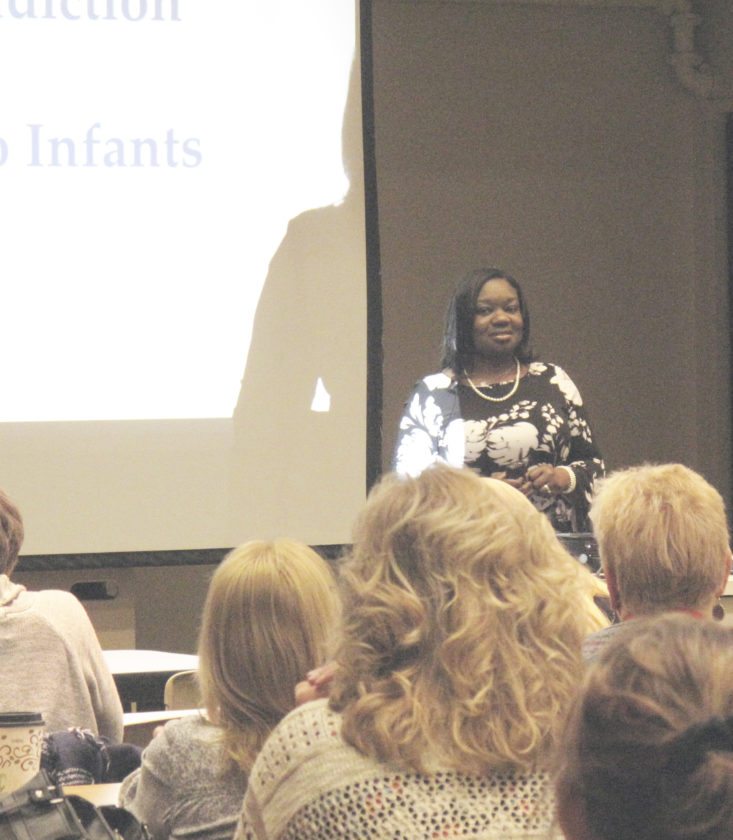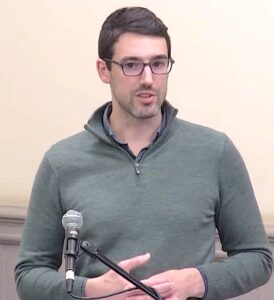Drug exposure to infants training draws big crowd

Davina Moss-King, Positive Direction and Associates president and certified rehabilitation counselor, presented on Opioid Addiction and Exposure to Infants on Friday morning at UPMC Chautauqua WCA. The training was put on by the hospital, Blackwell Chapel Baby Cafe and Chautauqua Alcohol and Substance Abuse Council.
JAMESTOWN – A timely training seminar to address the opioid epidemic and how it impacts the youngest community members was held at UPMC Chautauqua WCA on Friday.
The Opioid Addiction and Exposure to Infants training was put on by Blackwell Chapel Baby Cafe, UPMC Chautauqua WCA and the Chautauqua Alcohol and Substance Abuse Council. The training explored what impact opioid use had on infants, and what issues may follow after.
“The epidemic in our communities and nationwide is the cause for the Baby Cafe’s expansion into the area of opioids and pregnancy,” said Rev. Chloe Smith. “We are pleased to see all of you, every single one of you, are partnering with us to be able to be educated for this fight. This is the fight for our futures, this is the fight for our mothers and their babies.”
County Executive George Borrello said it was “heartening” to see so many people in attendance.
However, Borrello said it is unfortunate that the epidemic of opioid use caused the need for such a seminar.
“Particularly here in Chautauqua County, the rate of newborns testing positive for opioids is three times that of New York state,” he said. “So we have a particular issue in Chautauqua County that we have to address.”
Borrello said the county is going to take a much larger leadership role on the issue. He said he is working on forming a taskforce to take on the challenge called the Countywide Alliance For Enforcement and Rehabilitation.
“This is a group that will facilitate conversation with all stakeholders throughout our county that are working on this opioid epidemic,” Borrello said. “I think the issue that we have is that this is a huge problem, and we have so many people working on this problem, but we’re not always necessarily communicating. I don’t have the answers myself, but I would like to take a leadership role in facilitating better communication and cooperation so that we can use the limited resources we have to make sure we’re maximizing our impact.”
Davina A. Moss-King, certified rehabilitation counselor and New York state credentialed alcohol and substance abuse counselor, explained her background in opioid rehabilitation. Moss-King is an adjunct professor in the Department of Counseling and Human Services at Canisius College and is president of Positive Direction and Associates, a company that focuses on treatment, counseling and aftercare for women with opioid addiction.
“I started being a a counselor about 26-and-a-half-years ago, and I worked in New York City,” Moss-King said. “No one wanted to work with opioid dependent moms. So, being a first-year master student at NYU, they said ‘Davina, I think you’ll do it. You’ll be OK.'”
Her first family was located in Harlem, which made her nervous. She said the mother, father and a teenage daughter were all dependent on heroin. Moss-King said when she walked into the situation, she thought she would “save the world.”
“The mother looked at me and said, ‘Girl, sit down,'” she said. “She said ‘I want you to understand something: what we use, we use to function, we use to live, we use to love. This is not something you can cure – you can help me manage it, maybe, if that’s what you think you can do.'”
Moss-King said that’s exactly what she did. She sat with the mother and asked her about what caused her stress or made her uncomfortable. She worked on managing those issues and stressors, and later, worked on motivating her to want to turn her life around.
“Eventually, she did go into treatment, and 26-and-a-half-years later, I can’t tell you what happened to her because I graduated,” Moss-King said. “I was very proud of this mom. She actually decided to go back to school, and we cut her use down.”
While many people assume those who are addicted to drugs use them to get high, Moss-King said that often isn’t the case later in the addiction. Rather, the drug use occurs just to function normally. In many instances, women who are addicted to drugs have taken some kind of medication for an injury or pain, or could have experimented with drug use.
“The majority of patients I’ve seen throughout the years will use basically to get up in the morning, to use a lavatory, to do what you all did this morning,” she said. “A person who is opioid dependent will not be able to do that without first thing, before their feet hit the ground, is to use their drug of choice because their body is saying, ‘I can’t function without this.'”
Moss-King said that causes the individuals to use two or three times a day. She said mothers can at times also use alcohol, cigarettes or other substances, which would also impact the baby. She said there have been more instances of these issues since the spread of the opioid epidemic.
“Be aware of substance use and misuse,” she said. “If the mom is pregnant, even if she doesn’t think she has a problem, she should seek assistance immediately.”




